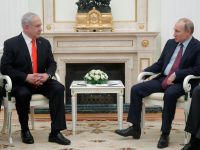Hundreds of Turkish police held marches in cities across the country on Wednesday following an armed attack on a police bus in Istanbul that left two dead and 11 injured.
The protests in the southern cities of Mersin and Adana, Gaziantep in the southeast and the western city of Izmir saw police, waving Turkish flags, condemn Monday's attack in Istanbul and shout slogans at Interior Minister Saadettin Tantan, the Anatolia news agency reported.
"Tantan, do not sleep, protect the police," the protesting officers chanted in Izmir.
A scuffle broke out in Izmir between several angry police and their chief, Hasan Yucesan, who tried to stop them from marching.
The protestors also denounced an amnesty law, passed by parliament last week, which is expected to free half of Turkey's 72,000-strong prison population when it takes effect.
The police argue that the law will release a lot of criminals, whom they have caught after hard effort, without even serving their full penalties.
Wednesday's protests were the second day of such demonstrations prompted by police anger and outrage over the killings of two colleagues when unidentified assailants fired on a police bus with automatic rifles.
An extreme-left underground group -- the Turkish Communist Party-Marxist-Leninist -- claimed responsibility for the attack, according to police officers.
On Tuesday, some 3,000 police marched in Istanbul in what was a first in Turkish history, demanding the resignation of Justice Minister Hikmet Sami Turk for excluding police convicted for torture from the amnesty.
A prosecutor in Istanbul on Wednesday launched an investigation to determine whether police were violating Turkish law by staging the marches and demonstrations.
They said that the law prohibits civil servants from holding protests.
Under the amnesty law, prisoners will receive a 10-year-reduction in their sentences except those condemned or facing charges of separatism, incitement, corruption, drug trafficking, money laundering, rape, fraud, membership to criminal gangs and breaches of tax and banking laws.
The law also calls for the suspension of jail terms of up to 12 years for 'freedom of expression' crimes made in print or public speeches -- ANKARA (AFP)
© 2000 Al Bawaba (www.albawaba.com)







